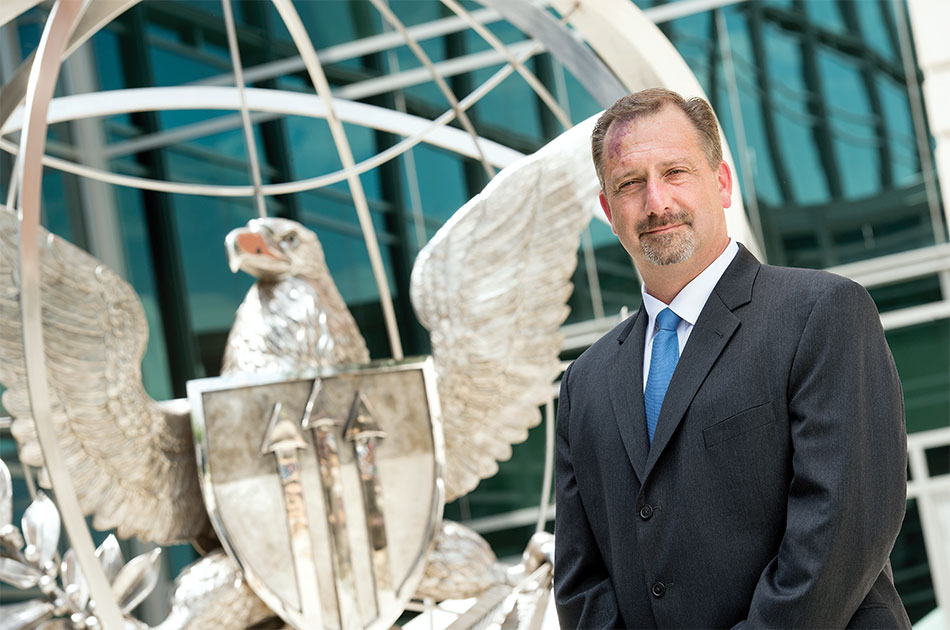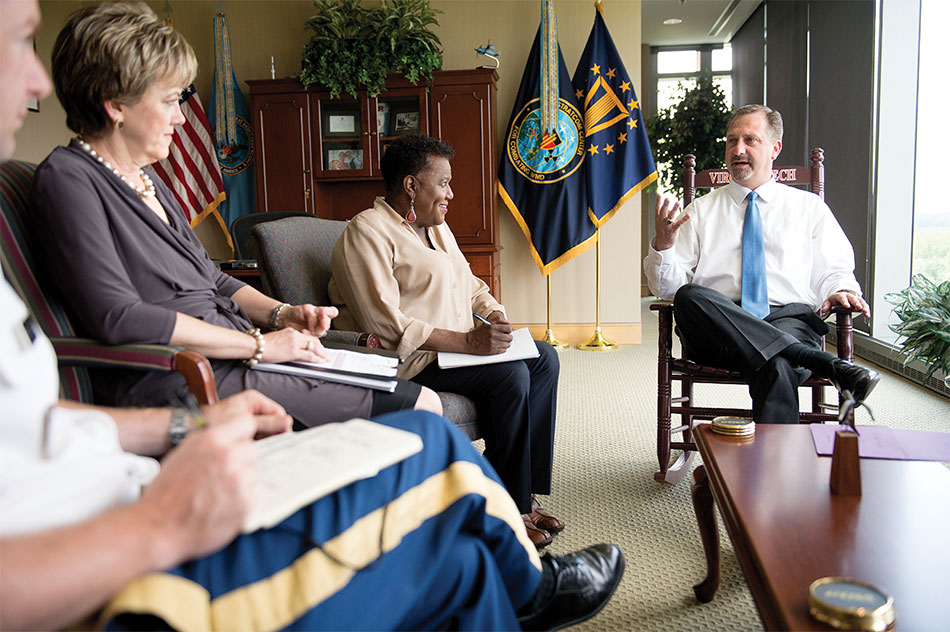
Ken Myers '92 directs the Defense Threat Reduction Agency, an organization protecting America and its allies from weapons of mass destruction. Photos by Logan Wallace.
The Defender
by Jesse Tuel
FORT BELVOIR, VIRGINIA—When no country was willing to host the destruction of 600 tons of chemical weapons material turned over by the Syrian government during the country's civil war, the international community turned to the U.S. for a solution.
The remedy came from the most important Department of Defense organization you've probably never heard of: the Defense Threat Reduction Agency (DTRA). Tasked with protecting the U.S. and its allies from weapons of mass destruction (WMD)—nuclear warheads, bombers, and submarines; and chemical and biological weapons and the infrastructure to create them—DTRA is powered by some 2,000 biomedical engineers, chemists, microbiologists, nuclear physicists, logisticians, contract specialists, accountants, and more. Because of this unparalleled depth and breadth of knowledge, DTRA is a peerless problem-solver, said Ken Myers (liberal arts and sciences '92), the agency's director since 2009.
The agency explored the idea of outfitting an American ship so that the weapons and materials could be destroyed at sea, in international waters. "The first couple of times we briefed on it, people thought, 'No, no, that simply can't be done.' Well, it can be done," Myers said. "It can when you bring all those specific skill sets ... together as one team. They come up with brilliant ideas. We can solve problems that literally no one else in the world can solve."
Much of DTRA's efforts in Syria were borne out of the Cooperative Threat Reduction Program, better known as the Nunn-Lugar Act. Enacted in 1991 at the behest of former Sens. Sam Nunn and Richard Lugar, the program aimed to secure and dismantle WMDs in former Soviet Union states. The program is now based at DTRA, whose mission has gone global.
When the status of Libyan and Syrian chemical weapons was uncertain amid civil wars; when radiation from the Fukushima nuclear plant meltdown threatened U.S. troops and dependents and a critical ally, Japan; and when the Ebola virus broke out in West Africa, DTRA, as a support entity for the various U.S. military commands, proffered solutions first theorized at the agency years prior. DTRA's robust R&D team, funded by about $2 billion a year, is engaged in basic, applied, and advanced research.
Nunn said Myers' leadership role in keeping Americans safe is unmistakeable. "There's no more important position in the Department of Defense. There [are some that are] higher-level, but there's none more important," Nunn said.

Immersion
From his office at the DTRA headquarters, with an expansive view of the dense woods typical of Northern Virginia, Myers admitted that his ascension involved luck: From 2003 to 2009, as a senior professional staff member for the U.S. Senate Committee on Foreign Relations, Myers rubbed shoulders with senators who have since become the U.S. president, vice president, and secretary of state and a recently retired secretary of defense. There was also the good fortune of Myers' father's serving as an aide and later staff director for Sen. Lugar.
Even so, to ascribe Myers' ascension to luck alone would dismiss the expertise he honed during his 15-year immersion in the Senate's global efforts in nonproliferation, counter-proliferation, and arms control. Traveling overseas regularly, helping to secure Congressional appropriations, and understanding Capitol Hill personalities, U.S. foreign policy, and the technical aspects of WMDs, Myers offered critical continuity to the Nunn-Lugar legacy.
His broad perspective made him "as strong as anybody I've ever worked with," said Nunn. "I had as much trust in Ken and his dad as I did in my own staff. We all worked as partners in common. I give him an A+ in all dimensions."
Said Lugar, "[Myers] developed a very keen sense of the dangers and the possibilities. It's one thing to sign legislation and pass treaties. It's quite another to figure out physically how this is to be done. Ken became a master of detail, figuring out ... the physical problems and how to solve them."
Moreover, as a Senate staffer, Myers had a hand in penning the future of DTRA's role. "I am now overseeing the implementation of the programs that I helped Senator Lugar design and write into law," Myers said.
Expansion
At DTRA, each day brings a new challenge, a new analysis, or a shift in an R&D approach. "We're not dealing with a static situation," Myers said. "There's a great line that military leaders like to use: 'The bad guy gets a vote, too.'"
U.S. military commands rely on DTRA expertise to help contain threats far from American soil. Under Myers' leadership, the agency has exported its success in the Soviet states into the Middle East, Southeast Asia, Africa, and elsewhere. DTRA now conducts programs in 100-plus sites worldwide, working alongside host-nation partners as an "advance shield" against threats, Lugar said.
After Myers became DTRA director, he asked Lugar to help establish stronger diplomatic ties in Kenya to provide, without encroaching on Kenyan sovereignty, security around a laboratory where farm animals were being tested for traces of such elements as anthrax and Ebola—agents sought by terrorists in the country.
"I would not have envisioned going to Kenya, for example, to further the cause of Nunn-Lugar," Lugar said. "I think [the approach in Kenya] was exceptionally creative thinking. Very few people would've thought through the problem in that way."
The "it" factor
Myers acknowledged that he has "an incredible opportunity to lead a skilled workforce that really does not exist anywhere else in the world," he said.
According to a defense-industry executive and a former fraternity brother, Myers has the right persona for the job. "He's got that kind of 'it,' whatever it is," said Craig Starnes (statistics '88, M.S. mathematics '89), a Booz Allen Hamilton vice president who has brought Myers to the company to speak about problem-solving and other professional development matters. "He's got a lot of charisma, and you want to follow him wherever he's going."
Raised in Northern Virginia, Myers was recruited by Virginia Tech and other universities to play soccer. In a tale many Hokies will understand, the campus visit sold him. As he approached campus on U.S. Route 460, the sun was rising behind Lane Stadium. "The whole place was glowing. It was beautiful," he said. And then he met Heather, a Radford University student. Married 19 years, the couple has two children.
As a student, drawn by the convergence of classroom lessons and world events, such as the first Gulf War and the fall of the Berlin Wall, Myers focused on political science, international studies, and English. "I fell in love with the concepts and the way that the world was changing before our very eyes," he said.
The lifelong learner now has an unparalleled understanding of global threats and how to defeat them, Nunn said. "[Myers] is quietly and effectively working every day, not seeking headlines, to secure Americans. We all should be very appreciative of that."